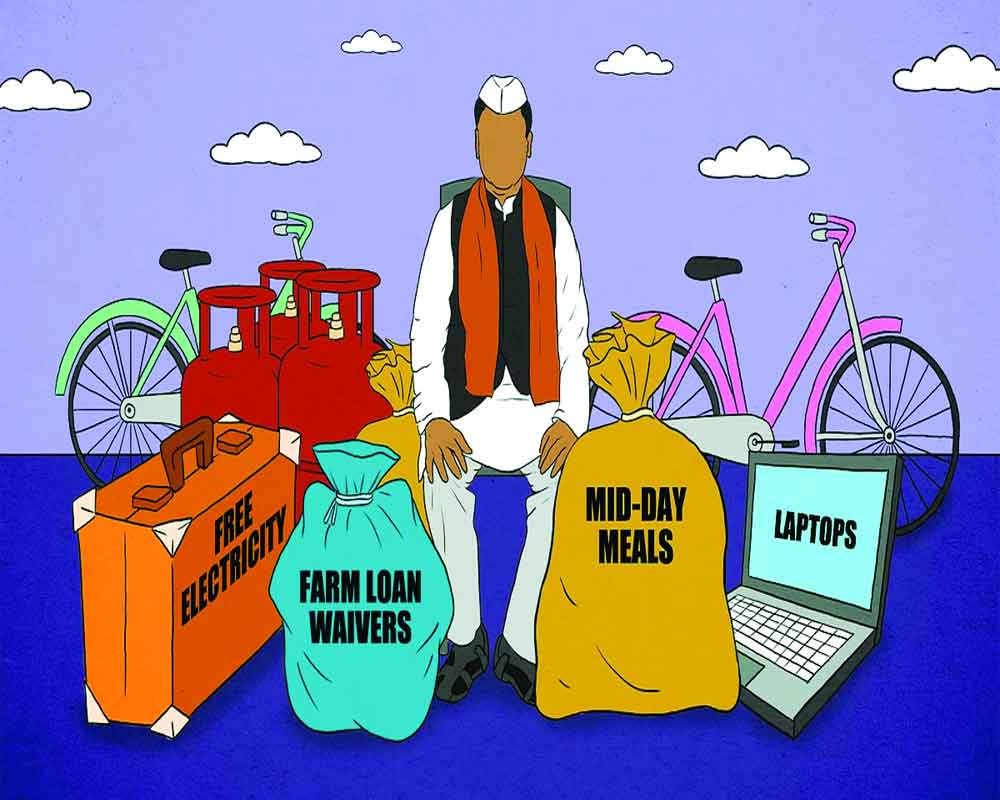States can’t pile up debt to fund extravaganza of politicians
The newly-elected Himachal Pradesh government has reinstated the ‘Old Pension Scheme’ (OPS) in its first cabinet meeting. Other states ruled by opposition parties have already announced switching back to OPS. These decisions have initiated a fresh round of discussion around freebies and fiscal prudence. Before going to the financial and other aspects of reverting back to OPS, it is necessary to understand the basic differences between these two schemes. In layman terms, under OPS a retiring employee was eligible to get a monthly pension of almost 50 per cent of his last drawn salary. Subsequent increments based on dearness allowance hike and pay commission revision was also included in the pension.
Under the new pension scheme (NPS), monthly contributions from both employees and government goes to a fund managed by PFRDA and the returns on this fund are market-linked. At the time of retirement, the employee can withdraw up-to 60 per cent of his corpus and he has to buy an annuity plan from the remaining amount. A monthly pension shall be paid out of the annuity.
In technical terms, OPS is a defined benefit scheme in which the liability of the employer (i.e., government) can go to any extent while NPS is a defined contribution scheme in which the employer is liable to the extent of its contribution. Another key difference between these two schemes is around funding. Matching a future liability with corresponding funding is basic economics and OPS failed on this parameter. While NPS corpus ensures that the future pension is going to be paid out of a dedicated fund created for it, OPS had no specific funding and the yearly outlay was out of budgetary resources. OPS was not only a drain on the government's resources, it was unfair to the taxpayers also because the current generation had to fund the ever-increasing pension bill.
As per RBI data, the pension bill of state governments has increased from Rs. 3,131 crores in 1990-91 to Rs. 406,867 crores in 2021-22 (BE). Pension liability has increased by 130 times over this period but there is no commensurate increase in revenue of the states to fund the bill. All of the states which have gone back to OPS are already facing revenue deficit and their fiscal position doesn’t allow them to go for such misadventures. Share of revenue expenditure has been increasing consistently over the years (71 per cent in 1984-85 to 79 per cent in 2018-19, pre-covid era), leaving lesser resources for asset/capacity creation.
NPS was implemented in 2004 and there was a consensus around this policy shift. All the state governments except West Bengal adopted this scheme over the period and breaking this consensus for petty political gains is not in public interest. A small section of society working in government sector will benefit out of this decision but the costs are going to be very huge because spending signi?cant portion of the state’s budget on pension will compel the government to curtail its outlays on general welfare as a whole. Former Planning Commission deputy chairman Montek Singh Ahluwalia also confessed that reverting to OPS is unwise and suicidal. There can be deliberations around bringing changes in the NPS scheme like introducing new products which have guaranteed return features but outrightly taking a U-turn on the pension reforms for immediate political mileage should be stopped.
If a state wants to implement OPS, then the Cabinet should also consider the present value of pension liability determined by actuaries and the funding status. In case there is an unfunded liability, then the Cabinet should also announce how it is going to meet it. States can’t be piling up their debt to fund the extravaganza of politicians. If the opposition is adamant on taking the poison pill, then Centre should consider amending the FRBM Act to include the unfunded pension liability of states due to reintroduction of OPS within the ambit of general government debt.
(The author is a Chartered Accountant and public policy analyst)























